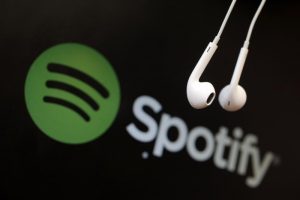 Spotify the leader in streaming music appears to be readying itself for a potential bumpy ride on the stock market on its first trading day Tuesday, following a sell-off on Monday of tech stocks by Wall Street.
Spotify the leader in streaming music appears to be readying itself for a potential bumpy ride on the stock market on its first trading day Tuesday, following a sell-off on Monday of tech stocks by Wall Street.
In a letter released to the public prior to the company’s unorthodox listing CEO Daniel Ek cautioned his employees as well as fans that at times we succeed, while at times we stumble and there is no doubt ups and downs will take place.
However, during informal trading Monday, pricing of Spotify appeared as if it were holding up, as it exchanged hands with prices of $132 per share, which gives the company a $23 billion value.
Ek, who is Swedish, the CEO and co-founder, said that nothing happens in a straight line and the last decade has taught him that.
Since launching the streaming music business ten years ago, the company has had to overcome initial resistance that was quite heavy from large record labels as well as amongst some music artists to transform the way the industry earns money. Spotify gives access to huge music libraries instead of making users pay to buy CDs or to download tracks or albums.
The company structured its listing on the stock market to allow its existing investors to sell to the public directly while offering no shares of its own. This is a test case that will be watched closely by other tech firms that are well-funded with no immediate needs for raising cash.
By not hiring any investment banks to underwrite the initial public offering or holding any of the traditional events to promote its IPO with institutional investors, this could create an extreme volatility in trading when the formal trading starts, say analysts.
The opening price to the public will be set by orders of buy and sell by the NYSE from dealers-brokers, said the exchange.
Based upon those orders, an opening price will be established on a basis of where the buy orders can be matched with sell orders at one price.
Global recorded music revenue fell by 40% from $23.8 billion in 1999 to $14.3 billion in 2014, when music file sharing service Napster nearly collapsed the CD market. Since 2015, growth has returned to the industry thanks to revenue from streaming services, which now represent 60% of sales of recorded music.
